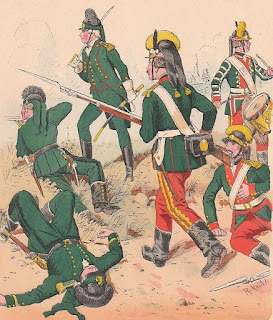Three posts in four days; I am almost up with Stew!
Although, he is posting about doing stuff, while I am just putting up a lot of text and a few piccies. Unlike the last two, this will be a 'quickie'. Like a... (see Stew's post for a relevant analogy).
I have done a bit of impulse buying.
Now I am not posting this as one of those social media 'look what I just bought/ate/drank kinda posts—I understand these occur all too often, but I wouldn't know as I don't frequent them 'platforms'—it's 'cause this book might be of interest to other's who are 'students' of the Napoleonic period (taking the widest span for that epoch).
I received an email today from Naval & Military Press promoting this little beauty. A quick look at the information and previews on their website and I was in! Around $60 (including postage by surface mail) for a hardback version that comprises 164 pages, 71 full colour uniform plates and an index and commentary in English, seemed like a good buy to me.
There are few volumes about the uniforms of the Russian army of the French Revolutionary and Napoleonic period. Certainly in English. Even fewer about the marvellous uniforms of the Potemkin reforms (1786–1796) and fewer still from the reign of Paul I (1796–1801).
The previews seem to show mainly Potemkin uniforms. There are no dates on the list of plates that is provided by Naval & Military Press in their information about the book, but I am hoping that quite a few will be of those under Paul I.
 |
| Not from this book, but detail of Knotel's representation of the Russian Potemkin uniform showing jägers, musketeers and a drummer (Wikimedia Commons). |
Information about the uniforms of the latter period, which the Russian army wore in Suvorov's campaign in Italy and Switzerland, is particularly sparse and confused. Several sources indicate that they were a 'back to the future', Seven Year's War-style. While inspired by that, they were a version from the latter stages of that period, which the Prussians did not adopt, and using pretty crappy material, from what I have read.
There's a description of them in Duffy's marvellous Eagles Over the Alps, along with a few plates (but in black and white), and it does not provide sufficient detail. Viskovatov's Historical Description of the Clothing and Uniforms of the Russian Army for the period 1796–1801 (I have Mark Conrad's translation from his website and as an ebook) is limited to organisation and the plates show a more Frederickian-type uniform. The best information about the uniforms of Suvorov's army in the alpine campaign is on the website Швейцарский поход (the "Swiss campaign"), which has an in-built English language translation.
Regardless of the range of the types of uniform shown in the plates in the book, I am sure that I am gonna enjoy it and find it really useful. I'll have to wait until it arrives, in a month or three.





